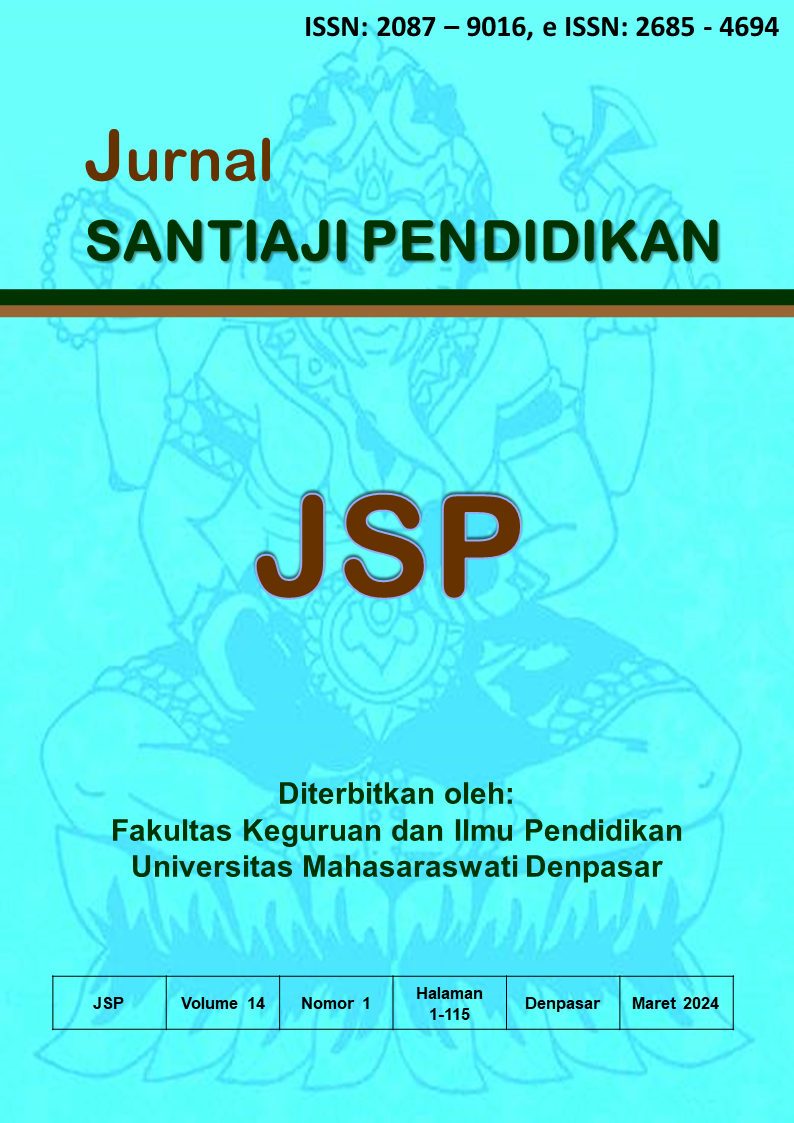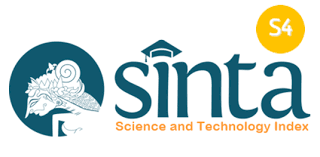THE SIGNIFICANCE OF TEACHER CORRECTION ON STUDENT CONFIDENCE AND WRITING ACHIEVEMENT
DOI:
https://doi.org/10.36733/jsp.v14i1.8084Keywords:
Koreksi Guru, Pencapaian Belajar, Keterampilan Menulis, Bahasa InggrisAbstract
Koreksi oleh guru dianggap sebagai faktor kritis dalam proses pembelajaran menulis, karena dapat memengaruhi bagaimana siswa menilai keterampilan menulis mereka dan pada akhirnya dapat memengaruhi pencapaian menulis mereka. Penelitian ini bertujuan untuk menyelidiki pengaruh koreksi oleh guru terhadap tingkat kepercayaan diri dan pencapaian menulis siswa dalam konteks pembelajaran bahasa. Penelitian ini menggunakan pendekatan eks post facto dengan desain korelasi sebab-akibat. Melibatkan 300 siswa kelas delapan sekolah menengah pertama dan melalui teknik purposive sampling, 10% atau 30 siswa dipilih sebagai sampel penelitian. Data dikumpulkan melalui kuesioner pre-test dan post-test yang mengukur tingkat kepercayaan diri siswa dan tes menulis paragraf deskriptif baik sebelum maupun setelah menerima koreksi dari guru. Data yang terkumpul dianalisis menggunakan uji t pretest-posttest berpasangan untuk menentukan signifikansi statistik dari perubahan yang diamati. Hasil menunjukkan bahwa koreksi oleh guru memiliki pengaruh signifikan terhadap tingkat kepercayaan diri siswa dalam menulis (7.133 > 2.045). Setelah menerima koreksi dari guru, siswa cenderung merasa lebih percaya diri dalam kemampuan menulis mereka dan lebih termotivasi untuk terus meningkatkan keterampilan menulis mereka (4.205 > 2.045).. Selain itu, koreksi oleh guru juga memiliki dampak positif pada pencapaian menulis siswa. Siswa yang menerima koreksi dan umpan balik dari guru cenderung menunjukkan peningkatan dalam kualitas menulis mereka. Temuan ini menyoroti pentingnya peran guru dalam memberikan koreksi yang efektif dan memberikan umpan balik konstruktif kepada siswa dalam proses pembelajaran menulis.
Downloads
References
Alharbi, S. (2016). Effect of teachers’ written corrective feedback on Saudi EFL university students’ writing achievements. International Journal of Linguistics, 8(5), 15–29.
Bitchener, J., & Ferris, D. R. (2012). Written corrective feedback in second language acquisition and writing. Routledge.
Black, P., & William, D. (1998). Assessment and Classroom Learning. Assessment in Education: Principles, Policy & Practice, 5(1).
Elfiyanto, S., & Fukazawa, S. (2021). Three Written Corrective Feedback Sources in Improving Indonesian and Japanese Students’ Writing Achievement. International Journal of Instruction, 14(3), 433–450.
Ellis, R. (2009). Corrective Feedback and Teacher Development. L2 Journal, 1(1), 3–18.
Ferris, D. (2011). Treatment of error in second language student writing. University of Michigan Press.
Ganji, M. (2009). Teacher-correction, peer-correction and self-correction: Their impacts on Iranian students’ IELTS essay writing performance. Journal of Asia TEFL, 6(1).
Hattie, J., & Timperley, H. (2007). The Power of Feedback. Sage Journals: Review of Educational Research, 77(1), 81–112.
Hyland, K. (2003). Second Language Writing. Cambridge University Press.
Hyland, K., & Hyland, F. (2006). Feedback on second language students’ writing. Language Teaching, 39(2), 83–101.
Kahyalar, E., & Yılmaz, F. (2016). Teachers’ corrective feedback in writing classes: The impact of collaborating with a peer during the editing process on students’ uptake and retention. The Reading Matrix: An International Online Journal, 16(1), 148–160.
Kluger, A. N., & DeNisi, A. (1996). The effects of feedback interventions on performance: A historical review, a meta-analysis, and a preliminary feedback intervention theory. Psychological Bulletin, 119(2), 254–284.
Lyster, R., & Ranta, L. (1997). Corrective feedback and learner uptake: Negotiation of form in communicative classrooms. Studies in Second Language Acquisition, 19(1).
Nikolopoulou, K. (2023). What Is Convenience Sampling? | Definition & Examples. Scribbr.
Ouahidi, M., & Lamkhanter, F. (2020). Students’ Perceptions About Teachers’ Written Feedback on Writing in a Moroccan University Context. In A. Ahmed, S. Troudi, & S. Riley (Eds.), Feedback in L2 English Writing in the Arab World. Palgrave Macmillan, Cham.
Phuket, P. R. N., & Othman, N. B. (2015). Understanding EFL Students’ Errors in Writing. Journal of Education and Practice, 6(32), 99–106.
Ruegg, R. (2018). The effect of peer and teacher feedback on changes in EFL students’ writing self-efficacy. The Language Learning Journal, 46(2), 87–102.
Sabarun, S. (2020). Direct teacher corrective feedback in EFL writing class at higher education: What students perceive. Vision: Journal for Language and Foreign Language Learning, 9(1), 17–32.
Sadler, D. R. (1989). Formative assessment and the design of instructional systems. Instructional Science, 18(2), 119–144.
Sapkota, A. (2012). Developing students’ writing skill through peer and teacher correction: An action research. Journal of NELTA, 17(1–2), 70–82.
Sepehrinia, S., & Mehdizadeh, M. (2018). Oral corrective feedback: teachers’ concerns and researchers’ orientation. The Language Learning Journal, 46(4), 483–500.
Siewert, L. (2011). The effects of written teacher feedback on the academic achievement of fifth-grade students with learning challenges. Preventing School Failure: Alternative Education for Children and Youth, 55(1), 17–27.
Tenny, S., Brannan, J. M., & Brannan GD. (2022). Qualitative Study. StatPearls Publishing.
Topping, K. (1998). Peer Assessment Between Students in Colleges and Universities. Sage Journals, 68(3).
Truscott, J. (2007). The effect of error correction on learners’ ability to write accurately. Journal of Second Language Writing, 16(4), 255–272.
Walz, J. C. (1982). Error’ Correction Techniques for the Foreign Language Classroom. Language in Education: Theory and Practice. In Language in Education: Theory and Practice (217 704). Washington DC.
Zolghadri, M., Jafari, S., & Izadpanah, S. (2020). The Effect of Self/Pair vs. Teacher Correction and Task Repetition on Individual and Pair Written Performance. Taiwan Journal of TESOL, 17(1), 1–33.
Downloads
Published
Issue
Section
License
Copyright (c) 2024 Ni Putu Dian Adnyani Putri, I Ketut Wardana, Dewa Ayu Ari Wiryadi Joni

This work is licensed under a Creative Commons Attribution 4.0 International License.











